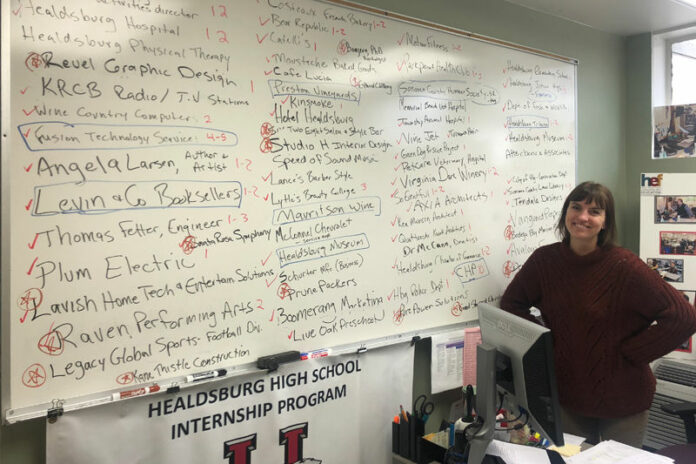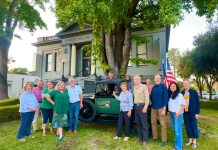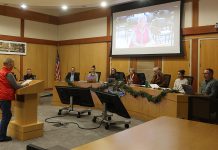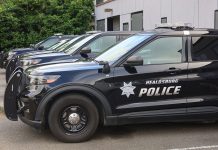
Innovative program matches interns and mentors for hands on experience
Stand in Shelley Anderson’s office and the first thing you notice is the board. It takes up an entire wall. It’s covered with the names of local businesses and organizations, some with red lines, some with blue stars. It’s huge and eye-catching and it represents Healdsburg High School’s academic internship program. Anderson is the Work Based Learning Coordinator at HHS and oversees the program.
Todd Everett started the program on a voluntary basis seven years ago. Anderson stepped in five years ago after being a mentor in the second year, when she owned the store Midnight Sun in downtown Healdsburg. “I got a call that said ‘I’ve got a kid who would like to own her own store one day, would you like to mentor her?’ I said sure. When I decided to close my store I saw the job listing for internship coordinator to coordinate this program, so that’s when I came on board. I had almost 20 years of business experience and been on the chamber board for many years and involved in the downtown business district, so I brought that community piece in. I had never been in education though, so I had a learning curve at first.”
The HHS program takes place over six days in January and February, and allows students to get real world, hands-on experience in a potential career of their choice.
Students then give a presentation about their experience to a panel of mentors, parents, teachers and community members. “Its open to the public, they just have to let me know,” she said. “We invite the mentors, the community members. We’ll have 25 different rooms, where six kids give their presentations,” she said. “They come to hear the students and give them feedback, we hand out a rubric, for things like ‘are they fidgeting, are they reading their slides,’ we spend a month working on their presentations and most have it down pretty darn good and it’s cool just hearing what they did.”
Anderson says in previous years she would approach people about mentorships and then offer them to students, but then she switched her approach. “I think one of the coolest things about our program is that when it started they went to the community, found people who wanted to be mentors and just plugged in the kids,” she said “Now I interview the kids first and find out what they want to do and then go find mentors for them, so it changes every year, which makes it interesting for me, interesting for them and makes it very student-focused.”
While this has ultimately produced a better program, she admits there can be gaps for certain interests.
“Engineering is a hard one because they are super busy and they often don’t have a lot of time. So we talk about a back-up plan,” Anderson said. “This year I had a girl who wanted to be a costume designer and I did manage to find that one. If a kid wants to be a musician or go into the music industry that’s tough, but I had one this year, and he’s gone to Speed of Sound Music, the music store; not exactly what he wanted. Or video game designers, I usually put them with a web designer and say start here.”
“I used to have hard time with attorneys,” she continued. “But last year we contacted the Sonoma County Law Library and they take our students interested in being lawyers and teach them how do research as it pertains to a case.”
Students have to give Anderson three choices of internships, and she says that certain trends in interests haven’t changed over the years.
“There are the ones that are always there,” Anderson said. “There are kids who are always going to want to be police officers, veterinarians, doctors, nurses, dentists, mechanics.”
On the flip side, other opportunities sometimes go unfilled due to lack of student interest. “I have culinary and hospitality, I can’t get students as interested in that and it’s such a huge part of our local industry,” she admitted. “In culinary, we get a few who say, I want to cook or be in a restaurant, but the wine industry I can hardly sell to kids. Either their family is already in it and they know they don’t want to do it or they think tourists are bad, or I don’t like wine. They don’t think of it, even though I tell them, wineries need marketing people or managers. Finance is hard because it’s people’s money; banks definitely can’t take interns for those kind of things.”
There is a luncheon for mentors before the program begins and mentors are provided coaching and information about hosting students. “It’s a nice kickoff for the mentors to get together. During the round table there are seven-year mentors talking to brand new ones, sharing best practices.”
Students must also sign a standards of conduct contract that includes items like following the company’s cell phone rules, “accepting supervision and constructive criticism graciously,” always knocking on closed doors and not bringing friends to work.
Mentors are given an orientation checklist covering suggestions like safety tours, employee facilities tours, company information and department specifics and workplace expectations. “The kids are nervous the first day,” Anderson said. “In my packet you’ll see ‘show them where the bathroom is, because they won’t ask.’ Where can they park, where can they put their purse?”
Though the internship program takes place in junior year, there is a work-based learning continuum that starts in freshman year and goes through senior year. In freshman and junior year there are classes to help focus students and their efforts. In sophomore year the class work takes place as part of their English class. Senior year, they focus on a civic action project and assembling a portfolio of their resume, transcripts, letters of recommendation and other documents.
Anyone interested in becoming part of the HHS academic internship program as a mentor or would be interested in attending the presentation night as a panelist is encouraged to contact Anderson at 481-3934.








